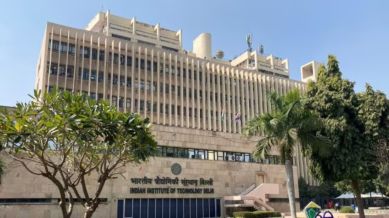Stay updated with the latest - Click here to follow us on Instagram
IIT-Delhi rolls out its first-ever PhD admission drive for SC/ST students
Data submitted to the parliamentary committee by the institute suggested that actual intake fell short of these targets, particularly at the doctoral level.

In a first, the Indian Institute of Technology Delhi (IIT-Delhi) has launched a special admission drive for PhD candidates from the Scheduled Caste (SC) and Scheduled Tribe (ST) categories, The Indian Express has learnt.
Officials said the move is aimed at addressing a persistent shortfall in seat occupancy; it comes on the heels of a visit by a parliamentary committee, earlier in April, that was tasked with reviewing the implementation of constitutional safeguards for marginalised communities in premier educational institutions.
The special drive is now open for applications until June 30.
According to an official at the institute, who spoke on condition of anonymity, internal assessments revealed a striking under-representation of SC/ST candidates in doctoral programmes.
“We noticed that PhD seats were not being filled adequately by students from reserved categories in the regular cycle that began in May,” the official said. “Even though we normally run another cycle in December, we anticipated the shortfall would persist, so we decided to roll out a special drive this year. This is the first time that IIT-Delhi has come up with this initiative.”
The Indian Express reached out to IIT-Delhi Director Rangan Banerjee and Press Relations Officer Shiv Yadav for comment but received no response.
As per the central government’s reservation norms, institutions like IITs are required to maintain 15% reservation for the SC category and 7.5% for the ST category in admissions to higher education programmes. However, data submitted to the parliamentary committee by the institute suggested that actual intake fell short of these targets, particularly at the doctoral level.
Between 2015-16 and 2024-25, SC enrolment in IIT-Delhi’s PhD programmes rose modestly from 8.88% to 9.69%. For ST candidates, the increase was from just 0.97% to 3.28%.
In contrast, the institute’s undergraduate and postgraduate programmes showed slightly stronger gains — SC enrolment in postgraduate courses rose from 11.27% to 13.11% over the same period, and from 13.85% to 14.92% at the undergraduate level.
The parliamentary panel’s April visit to the campus appears to have created fresh momentum. “This year, the SC/ST commission’s visit has created awareness and sensitisation, prompting the institute to act more actively,” the official added. “There has not been any specific communication from the Ministry of Education in this regard, but we echo with the Ministry’s broader guidance to adhere to constitutional norms in filling reserved seats.”
Among the most significant barriers identified by the institute was the sheer lack of applications from SC/ST candidates. “One of the major issues is that we are not receiving enough applications in the first place,” the official said.
To address this, the institute is relaxing certain departmental-level flexibilities. While IIT-Delhi sets minimum eligibility — such as a 5.5 CGPA in Master’s for SC/ST candidates and a valid qualifying exam score like GATE — individual departments are allowed to set higher benchmarks. “But under this special drive, departments are to adhere to the institute’s minimum criteria…,” the official clarified.
The special drive is also being extended across departments, regardless of whether they currently have vacancies. Departments have been instructed to consider eligible candidates from reserved categories, if found suitable. “If they find a suitable candidate, they can take the candidate in on a supernumerary basis,” the official said.
In its earlier submissions to the parliamentary committee, IIT-Delhi acknowledged that dropouts from PG and PhD programmes were not uncommon. “Some students leave… on personal, medical (reasons), better job opportunities, and better prospects,” the institute had stated.